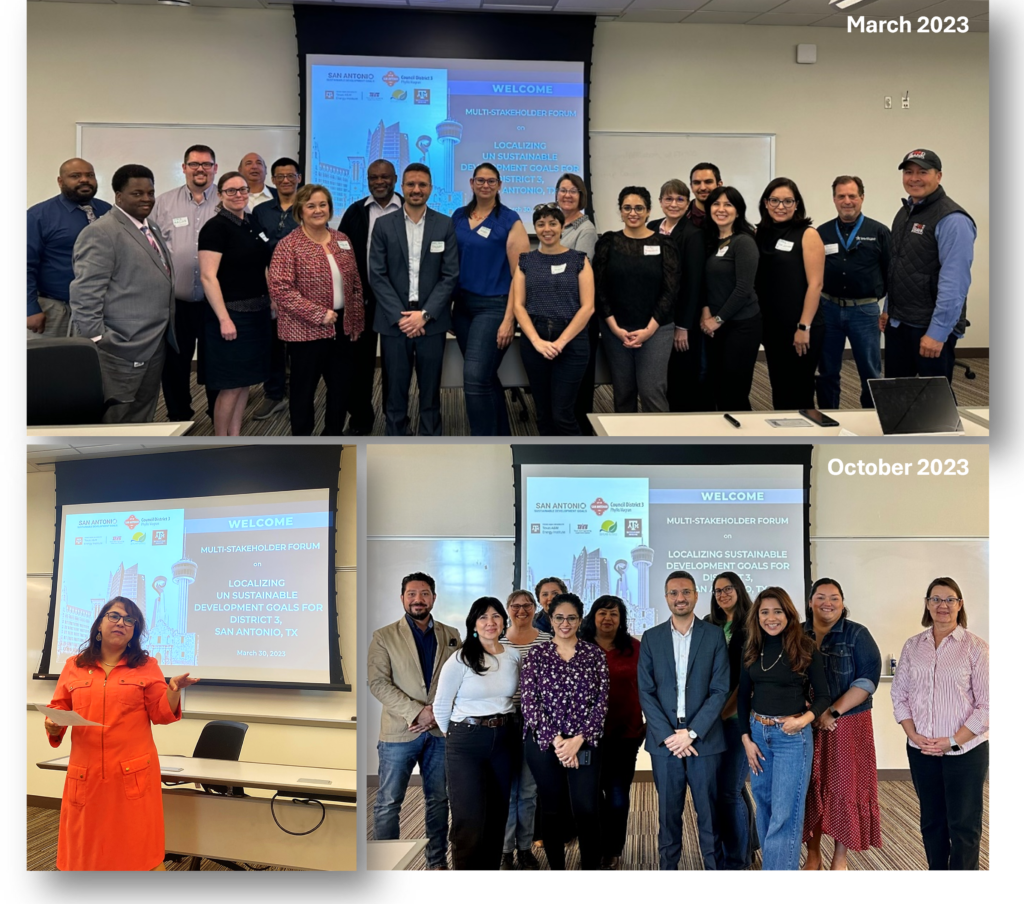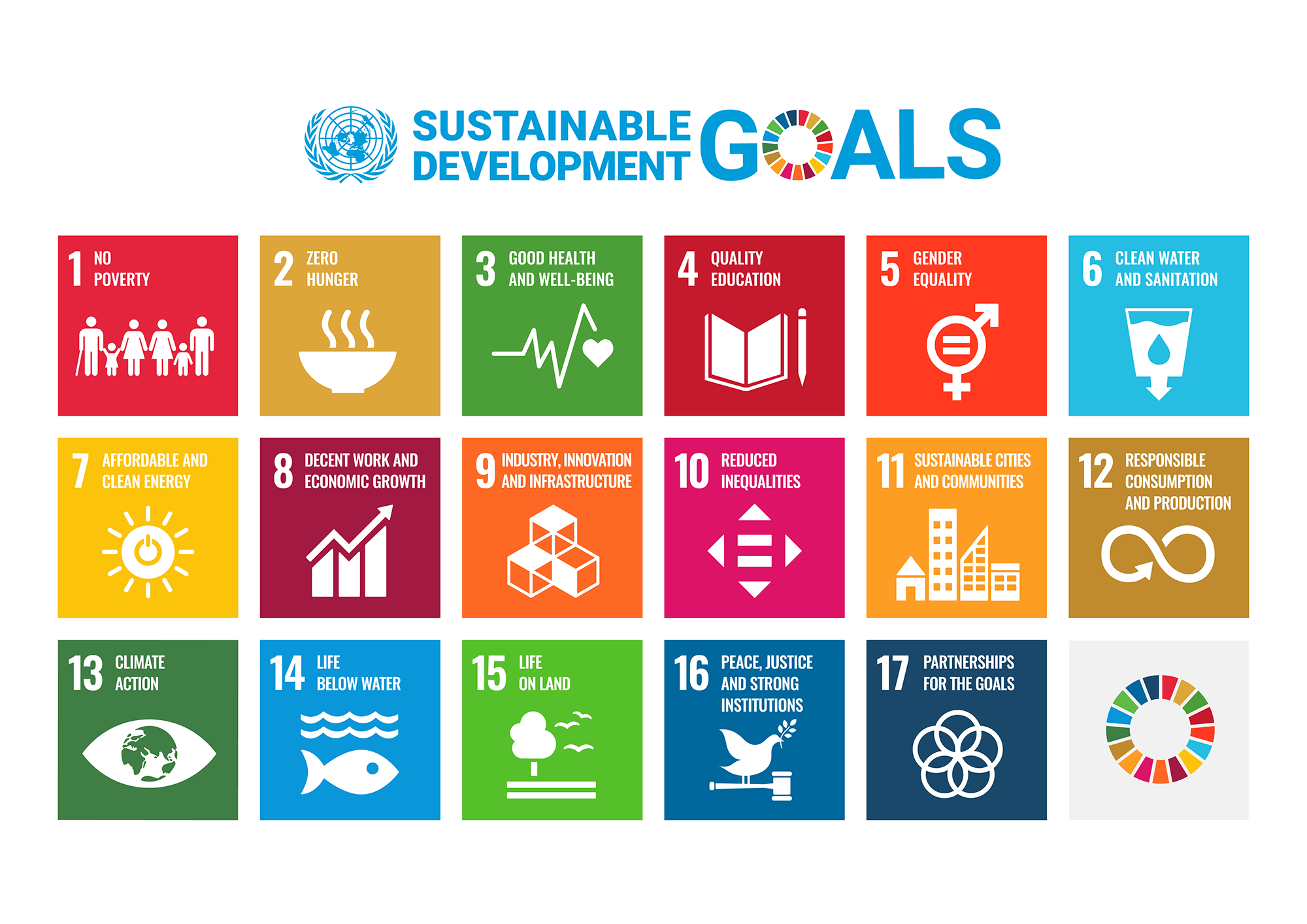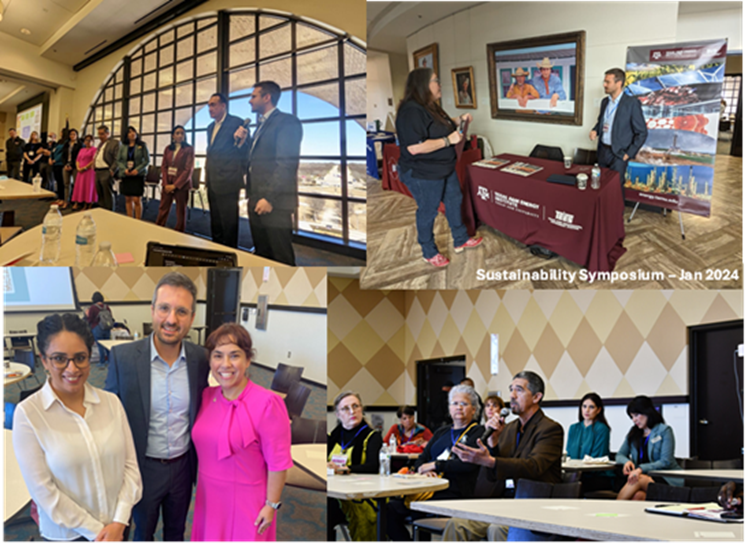A Community-Engaged Approach for Developing a Localized Sustainability Dashboard for the City of San Antonio, Texas
While the United Nations Sustainable Development Goals offer a valuable framework to guide progress at the global and national levels, effective implementation often requires action at the local level. Partnering with Councilwoman Phyllis Viagran of District 3 in the City of San Antonio, Dr. Bassel Daher, Texas A&M Energy Institute Research Scientist, along with the support of Doctor of Engineering student Sai Kapalayam from the Department of Multi-disciplinary Engineering at Texas A&M University, has led a year-long initiative dedicated to localizing sustainability goals within the San Antonio context. This collaborative effort involved a series of workshops wherein cross-sectoral stakeholders were actively engaged in sharing their definition of sustainability and the metrics they would like to use to measure progress within their community.
Stakeholders from diverse sectors including water, energy, food, health, education, conservation groups, housing, council of governments, and economic development converged to deliberate on questions including: What does affordable and clean energy mean for San Antonio? What does good education and good health mean? What does a food secure San Antonio look like? How should these goals be measured?
The discussions centered on identifying indicators relevant to San Antonio and brainstormed new programs and interventions aimed at enhancing sustainability within the city. This collaborative approach underscores the importance of community engagement in shaping localized strategies for sustainable development. The overall goal from this activity is to make available to the city a customized Sustainability Dashboard, that is co-created by the community, and that can guide evidence-based programming and investments toward a more sustainable, resilient, and equitable San Antonio.

Sustainable Development Goals… What are they?
The United Nations Sustainable Development Goals (SDGs) represent a global call to action to address pressing challenges facing humanity, ranging from poverty eradication to environmental sustainability. Adopted by all United Nations Member States in 2015, the 17 SDGs serve as a blueprint for collective efforts towards a more equitable, prosperous, and sustainable world by 2030. These goals encompass a broad spectrum of interconnected issues, including poverty alleviation, gender equality, clean water and sanitation, affordable and clean energy, sustainable cities and communities, climate action, and biodiversity conservation, among others. Emphasizing the interconnectedness of social, economic, and environmental dimensions, the SDGs underscore the imperative for collaborative and inclusive approaches to achieve lasting progress towards a more sustainable future for all.

Co-creating the Sustainability Dashboard
Over the past year, the localization of ten out of the 17 SDGs has been a primary focus, aligning with the city’s sustainability plan and informed by stakeholder recommendations. The research team initially identified 120 localized indicators sourced from reputable data outlets, stratifying these indicators based on data availability. Engaging cross-sectoral stakeholders from District 3 and the broader San Antonio community marked the subsequent phase, aiming to pinpoint gaps in the existing sustainability framework, validate localized SDG indicators, and propose solutions for community sustainability.

These workshops brought together participants from over 20 diverse organizations across the city. The collaborative efforts culminated in the co-identification of 55 new indicators for tracking progress across the ten prioritized SDGs, accompanied by proposing 53 actionable solutions to advance progress toward achieving the SDGs.
The workshops served as a forum for sharing District 3-specific knowledge and experience about the policies and programs required to achieve the SDGs. They further paved the way for the stakeholders to collaborate on advancing the localization of SDGs in the rest of the city’s 9 Council Districts.
District 3 Sustainability Symposium – A recap and continuation of the dialogue
On January 27, 2024, District 3, led by Councilwoman Viagran, convened a Sustainability Symposium. The symposium served as a platform to reflect on the progress achieved over the past year while fostering dialogue among cross-sectoral stakeholders regarding the city’s key sustainability challenges and opportunities. The symposium highlighted the level of interconnectedness between the different goals and the need for great coordination and collective action across sectors. The dialogue further reinforced the importance for measuring sustainability metrics and the role of such tools in supporting future programming and policy making.

Moving forward, the team remains committed to fostering continued collaboration with District 3 and the broader city of San Antonio to refine and implement the localized Sustainability Dashboard. Key priorities include developing a user-friendly interface that facilitates accessible data visualization and engagement with sustainability metrics. Furthermore, the team aims to replicate its success by extending similar initiatives to other cities within Texas and across diverse communities throughout the United States. By leveraging lessons learned and building upon existing partnerships, the endeavor seeks to catalyze transformative change and promote sustainable development on a broader scale, underscoring the importance of community-driven approaches in shaping resilient and thriving communities.

